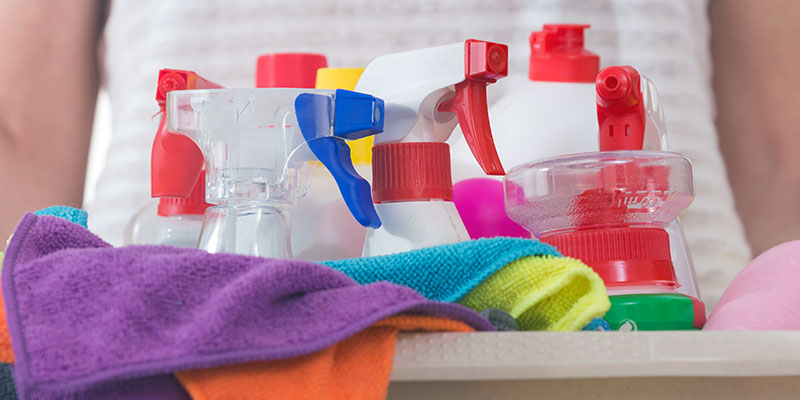Location
Our Washington Location
Our inpatient facility is located in Washington, and will serve Washington state. It will provide a safe & therapeutic environment for both our staff and patients.
- Edmonds
7416 212th St SW,
Edmonds, WA 98026
It may be surprising to hear that cleaning fluid abuse and even addiction are common among young people. In general, neither they nor their parents understand that treatment is available to help people stop using these substances. They are extremely dangerous, and more people need to be made aware of the risks.
There are several common types of cleaning fluid that people might use to get high. They include:
This is not an exhaustive list, but any of the substances above can lead to a euphoric high. Huffing is the most common way of using them, and it is incredibly dangerous.
Cleaning fluids are popular among young people because they are so readily available. A peek into the cupboard can yield several types for them to choose from. There are also no age restrictions for buying most of them at the store. But these products are dangerous, and people need to know the risks of abusing them. Many people get addicted to them and once they do, treatment is generally needed to help them stop.
When you use cleaning fluids, your brain receives the greatest impact from them. As the cleaning fluids are consumed, brain cells die because they’re being deprived of oxygen. That means your brain is becoming damaged, and this can lead to a host of problems all throughout your body. The short-term effects of cleaning fluids might include:
The longer you use cleaning fluids, the more damage you’re doing, and the long-term effects of cleaning fluids might include:

You may be wondering, what is cleaning fluid abuse, and what are the signs of cleaning fluid addiction? Cleaning fluid abuse refers to the use of cleaning fluids that goes outside of their intended purposes. If you’re abusing cleaning fluids, you don’t yet feel as though you need to use them just to feel more like your normal self. However, you can become addicted to cleaning fluids very quickly once you start abusing them.
Some common cleaning fluid addiction signs can include:
While there can be some physical components of being addicted to cleaning fluids, experts agree that the addiction itself is mostly psychological. Users tend to congregate with other users, and they’ll shut out anyone who isn’t a part of their small group of people. Cleaning fluids impact the dopamine levels within the brain, and they can have a direct effect on whether or not you feel normal. After some time has passed, you find that you need cleaning fluids just to feel like yourself during the course of the day.
The psychological hold that cleaning fluids can have over your life are quite strong. This is why professional help is recommended to overcome this addiction, and cleaning fluid rehab is considered to be the best option.
It’s common to believe that you won’t go through any symptoms of withdrawal when you stop using cleaning fluids, and this simply isn’t true. Although they are readily available, they are also very dangerous, and quite difficult to stop using once you have an addiction to them. Some common withdrawal symptoms include:
The bottom line is that these chemicals are very hazardous, and if you’re demonstrating any cleaning fluid addiction symptoms at all, it’s important to get professional help so that you can stop your use of them safely.
Cleaning fluid treatment centers are prepared to deal with the issues that center around this type of addiction. Because it’s an addiction that usually occurs to younger people, it must be assumed that there are problems that led to the addiction. For example, many of the teenagers or children who choose to abuse cleaning fluids do so because they’re a part of a dysfunctional family, and their cleaning fluid abuse allows them to escape these feelings.
In inpatient rehab, these issues can be easily addressed so that healing can take place. Family sessions to talk about the underlying cause of the addiction can be so helpful for those in inpatient cleaning fluid rehab. Group therapy sessions offer the opportunity to share and hear from others about their experiences with cleaning fluid addictions as well.
Inpatient cleaning fluid rehab is highly recommended for anyone who is addicted to cleaning fluids because it is essential to receive a high level of support for recovery.
Northpoint Washington is often celebrated for having one of the best addiction recovery centers in the state. We are located in Edmonds, Washington, which is conveniently located close to Seattle and many other major cities.
When patients walk through our doors for the first time, they often feel right at home. Our modern facility is equipped with all of the comforts a luxury rehab should offer. Our staff members are always very eager to talk with new patients and set them at ease. We want people to feel comfortable while they are with us. That way they can focus more fully on reaching their recovery goals.
We know that every addiction is different, and because of that, personalized approaches to recovery are vital. Every patient we treat has their own treatment plan that has been designed to meet their unique needs. We are also a very small facility with a high staff to patient ratio. With only 22 beds, our efforts can be more on the individuals we are serving.
We are an inpatient treatment facility, and our program runs for 28 days. Inpatient means that our patients commit to staying with us for that length of time.
Treating a substance abuse problem takes a targeted approach, and our patients move through three phases during recovery. The first one is to go through detox, if necessary. Not everyone will need to experience the detoxification process, but it really depends on how they feel. We do not want people to suffer needlessly through withdrawal if it can be managed with other treatment methods. Some of our cleaning fluid-addicted patients may be recommended for medical detox.
The next phase is when therapy begins during rehab. Therapy is so important because it helps doctors and therapists learn what led to the person becoming addicted. Once the cause is determined, the proper steps can be taken to address it and provide the appropriate treatment. Our patients undergo many types of therapy, including group sessions, family therapy and individual counseling.
Finally, once the 28-day program is over, our patients are ready to be discharged. But they are always sent on their way with a detailed aftercare plan. Aftercare may be the most important part of the recovery process. Our staff is very careful to make sure they provide our patients with follow-up plans that are clear and easy to understand.
Many of the patients we work with suffer from cross addictions and/or co-occurring disorders. It is not uncommon for people to have both.
A cross addiction is when the individual is addicted to more than one substance. Someone who is addicted to cleaning fluid might also struggle with alcoholism or marijuana, for example. We are very careful to treat both addictions, which gives the person a better chance of recovery.
Also, co-occurring disorders are very common among addicts. This term means that the individual has a mental health condition that also needs to be treated. Dual diagnosis treatment allows us to do that, and it has shown to be very effective.
It is not as expensive as most people think to enter into a high-quality rehab program when people have insurance. The Affordable Care Act has made it much more possible for people to get the professional treatment they need. This healthcare law has required insurance companies to provide these benefits to their customers.
Many of our patients find that they only need to pay a small copay in order to start treatment right away. There are also some who find that their care is covered in full.

At Northpoint Washington, we think it is a tragedy that so many people are addicted to cleaning fluids. Most of them have no idea what type of damage they could be doing to their bodies. But we want you to know that you do not have to continue to suffer if you are an addict. We can help you stop.
A lot of people fail to get the help they need to recover from their addictions because of shame. They do not want anyone to know they have been using, and they are nervous about admitting it. We want you to know that we protect your privacy. We offer a judgment-free experience so that you can get the assistance you need.

Our admissions coordinators are here to help you get started with treatment the right way. They'll verify your health insurance, help set up travel arrangements, and make sure your transition into treatment is smooth and hassle-free.
888.450.2153Contact Us